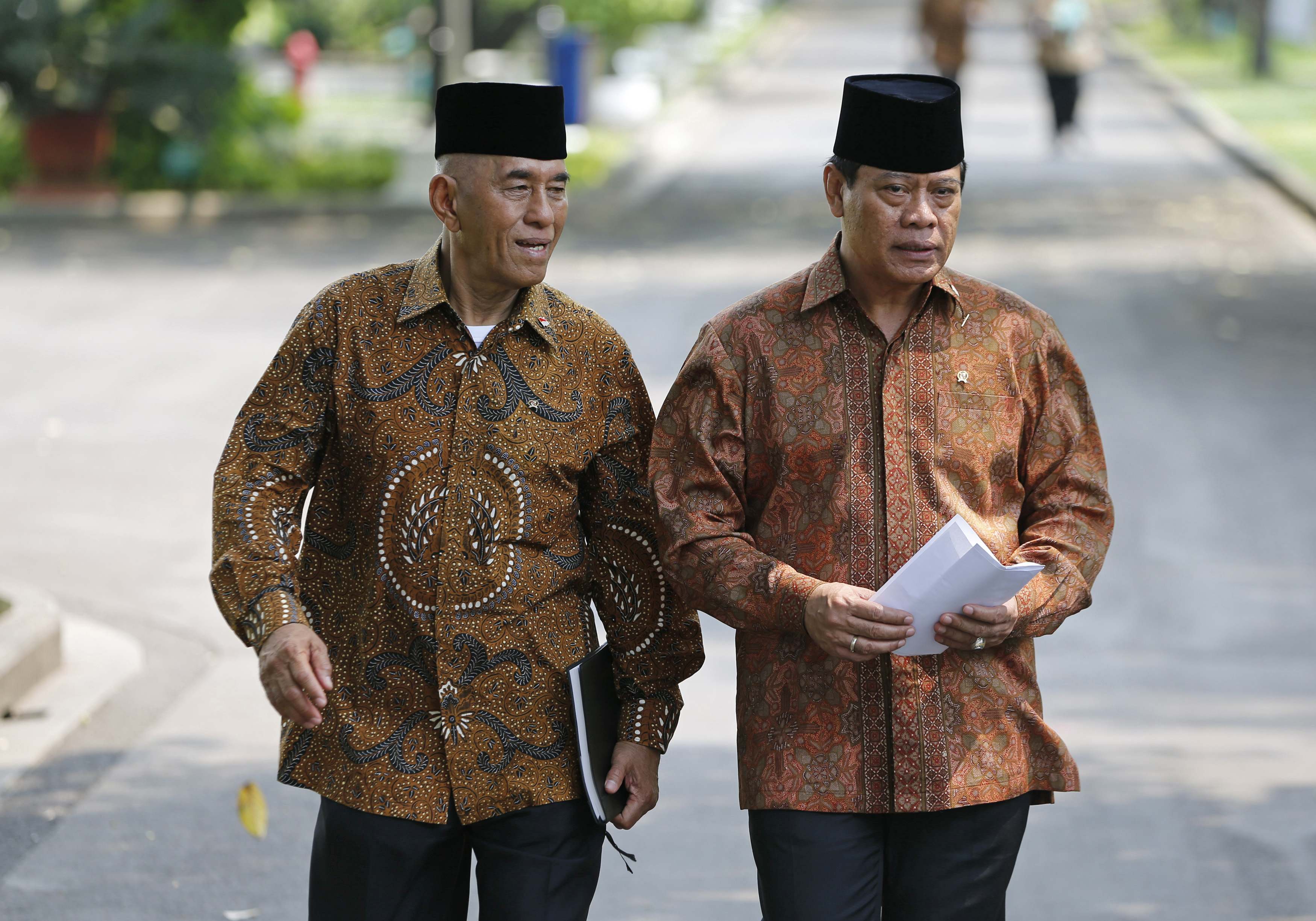By Farouk Arnaz, Ridho Syukra & Markus Junianto Sihaloho on 08:35 am Oct 28, 2014
http://thejakartaglobe.beritasatu.com/news/back-seat-seen-human-rights-jokowis-defense-lineup/

Defense Minister Ryamizard Ryacudu, left, and Coordinating Minister for Security Tedjo Edy Purdjianto walk to a cabinet meeting after their inauguration ceremony at the Presidential Palace in Jakarta on Oct. 27, 2014. (Reuters Photo/Beawiharta)
Jakarta. Retired Navy admiral Tedjo Edy Purdjianto will have his work cut out for him as Indonesia’s new coordinating minister for political, security and legal affairs, particularly in acting on President Joko Widodo’s narrative of turning Indonesia into a “global maritime axis,” observers and politicians say.
Poengky Indarti, the executive director of the Indonesian Human Rights Monitor (Imparsial), said on Monday that Tedjo, the former Navy chief of staff with a brief stint in the Defense Ministry, had achieved little during his time in the armed forces to reform and modernize the Navy.
“Unfortunately when he was in office we didn’t see a lot of achievements,” Poengky said.
Golkar Party legislator Tantowi Yahya said Tedjo would have to deal with a myriad of security issues, including the ever-present threat of terrorism, escalating tensions in the South China Sea, and the sporadic disputes between soldiers and police officers over control of protection rackets and other rent-seeking activities.
Tedjo, Tantowi said, “must formulate a blue print for defense in keeping our sovereignty,” adding that the new minister must act fast.
Tedjo served in the Navy for 34 years before his retirement in 2009. He subsequently moved into politics, joining the newly established National Democrat Party (NasDem).
People’s Conscience Party (Hanura) legislator Susaningtyas Kertopati said Tedjo could translate Joko’s “maritime axis” vision into actionable plans, but may lack in other key policy areas.
“The new security minister must make breakthroughs and have adequate political communication skills to deal with the House of Representatives,” where the opposition controls a majority of seats, Susaningtyas said.
“Tedjo must also be able to coordinate the ministries under his purview so they can perform well,” she added.
She said Tedjo must choose his staff well to complement his maritime knowledge and experience with experts in other areas.
Failure to address security and border issues could have serious political implications for Joko’s administration, but the president appears to have anticipated this by choosing Ryamizard Ryacudu, a former military general with extensive combat experience, as his defense minister.
But Ryamizard could have a tough time as minister, Susaningtyas said.
“Being a defense minister is not only about managing soldiers,” she said. “He will also have to manage the defense industry.”
Ryamizard is known for his straightforward and unvarnished approach and inflammatory remarks, particularly on border issues — a tactic that has won him support from soldiers and the public, who see him as patriotic, but raised concerns among international relations observers.
Analysts says Ryamizard’s tough stance could steal the spotlight away from another retired general, Prabowo Subianto, Joko’s rival in the presidential race and now the opposition’s figurehead.
Poengky said she was concerned that respect for human rights might be taking a back seat in Joko’s cabinet with the appointment of Ryamizard.
“Civilian ministers show that democracy is in the hand of civilians. This is a setback,” she said.
Ryamizard has a checkered human rights records, she said, highlighting the high civilian casualties during the time he led military operations to fight armed insurgencies in East Timor, Aceh and Papua.
The Commission for Missing Persons and Victims of Violence (Kontras) said the appointment of the controversial former general to the new cabinet showed that Joko was “negligent” toward human rights issues.
